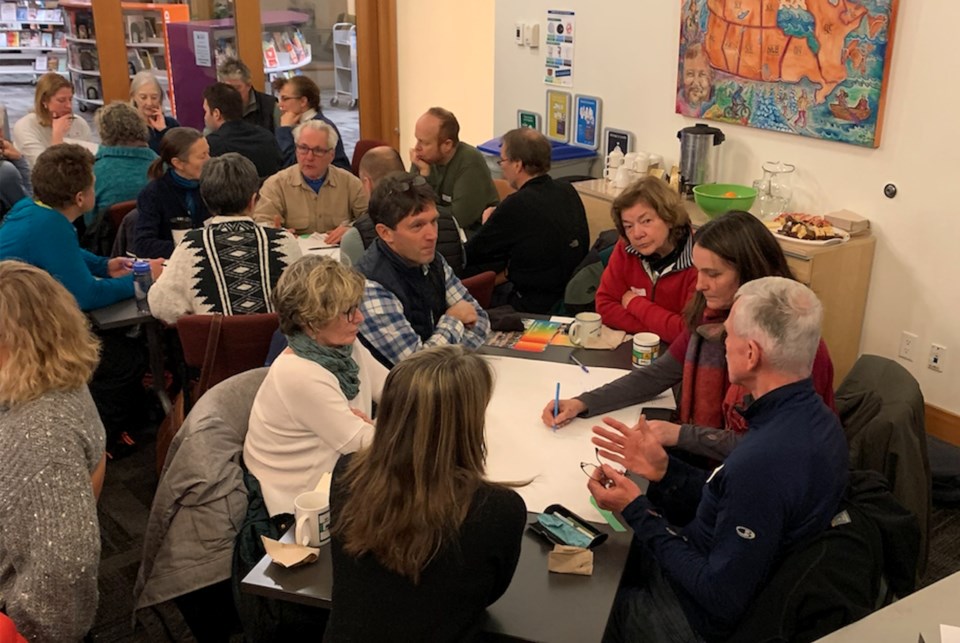Released last March, the Whistler Community Foundation’s (WCF) most recent Vital Signs report includes 13 pages worth of data proving what most locals already know: not everyone in Whistler is thriving, as the document concluded.
Still, WCF executive director Claire Mozes said she’s since heard from some corners of the community who “were really surprised” by the sobering stats laid out in the report. For example, numbers pulled from the Whistler Community Services Society’s books showing a record-high 8,380 people accessed its outreach services for mental and emotional support in 2022, more than a four-fold increase from the 2,040 people outreach workers served in 2018.
“If your job [isn’t] connected to that, or you haven’t experienced a mental-health crisis, or your friend or family member hasn’t, you might not know that it’s in the state that it is,” Mozes explained.
“It’s hard to tackle any issue if we aren’t all somewhat on the same page,” she continued. “We might not all agree on everything, and that’s totally fine, but if everyone doesn’t really understand what’s happening, it’s hard to move forward.”
As a busy summer season gives way to cooler temperatures and a quieter town, the foundation has planned a pair of upcoming events aimed at bringing Whistlerites together to dig a little deeper into those stats and talk about what, exactly, moving forward might look like.
The WCF’s two “Vital Conversations” at the Whistler Public Library this fall will focus on the same two questions this year’s Vital Signs report sought to answer, while considering issues linked to affordability, housing, mental health, the environment, child care, transit and everything in between.
The first event, scheduled for this Wednesday, Sept. 27 from 6 to 8:30 p.m., will explore, “Is our community livable?” The second Vital Conversation, set to take place at the same time on Wednesday, Oct. 18, instead asks “Is everyone thriving?”
Both events are free to attend, but space is limited. Each will accommodate a crowd of about 50 people, who will split into small groups scattered around the library’s fireplace. Leaders stationed at each roundtable will be armed with a set of prompts, ready to guide a thoughtful discussion about the intertwining challenges Whistler faces. Both events will follow the same format, but incorporate different data points and discussion themes, Mozes explained.
“We aren’t trying to solve all the world’s problems, or all of Whistler’s problems, but we have a lot of data, and what we really want is people to come and talk about it,” she said. “We have all these numbers, and we did get some stories as well in the report and the compilation of that, but this is an opportunity for the community to come together and participate as a group, and hopefully learn from each other, perhaps build some relationships … maybe you’re going to meet somebody that you have never met before, but you feel the same way about the same issue, and maybe somebody has an idea about how to tackle that issue.”
From established community leaders to new arrivals, Mozes stressed everyone is welcome.
“Nobody has to come in as an expert. Nobody has to come in with all of the answers—that’s not really what this is about,” she said. “Everybody that walks in is part of this community, so they belong.”
Locals who aren’t able to attend either event can still voice their opinions. A pre-event survey available on the WCF’s website—and on a poster accompanied by sticky-notes in the library’s lobby—asks, “What would have to be true for Whistler to be livable for you?” The foundation will display answers at next Wednesday’s event.
“That’s a powerful question for sure—not an easy, or quick one to answer, either,” Mozes acknowledged.
The WCF team did its best in a pair of definitions crafted ahead of the upcoming Vital Conversations, guided by the United Nations’ Sustainable Development Goals.
The foundation defines a livable community as one “that provides and prioritizes affordability and personal independence, economic opportunity, safe and secure living conditions, justice, choice of mobility options, including active and public transit, and fosters a sense of community—allowing residents of all ages to thrive and engage in civic, economic and social life.”
As for what it means to thrive? Those individuals “feel autonomy over food and housing needs, economic stability, physical and mental health,” according to the WCF. “Community members feel welcomed and comfortable in all home, work, and community spaces where they can contribute positively and proactively. Everyone feels empowered and supported in managing the challenges life throws their way with resiliency—and can see the same for their future.”
From Mozes’ perspective, Whistler can’t have one of those visions without the other. “If you have a livable community, you probably have a much better shot at having everyone in it thriving,” she said. “And if everyone’s thriving you probably have a livable community.”
Vital Signs is a global program launched in Toronto in 2001 to spin community knowledge into positive local impacts. The WCF, primarily responsible for managing long-term endowment funds and awarding grants to local organizations, kickstarted Whistler’s Vital Signs program in 2016. Typically after each long-form census, WCF stakeholders compile statistics from a wide range of local, provincial and national sources into a single report measuring how the resort’s community is faring. Each Vital Signs report functions as a “community check-up,” helping the foundation decide where to direct its funding and sparking broader conversations within the community.
Registration for both Vital Conversations is encouraged. Reserve your spot or participate in the WCF’s pre-event online survey, here.




